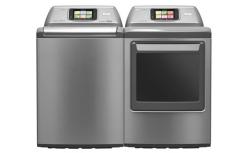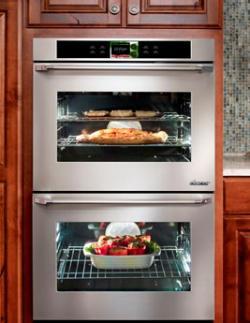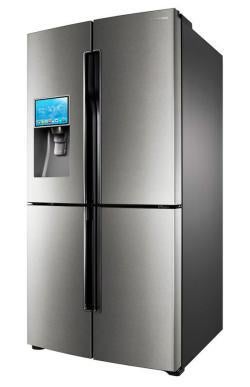Smart appliances get no love. Every year at the Consumer Electronics Show, the world’s gadget makers unveil a slate of refrigerators, ovens, and washer-dryers that they insist have been infused with superior intelligence. And every year, everyone scoffs. That’s because smart appliances’ smarts are usually pretty stupid and never worth the price. This year Samsung showed off a $4,000 fridge called the T9000. It’s got an LCD touch screen and a wireless connection to the Internet. That’s the sine qua non of intelligence according to gadget makers—slap a touch screen and Wi-Fi on a fridge and voilà, you’ve got yourself an icebox with an IQ to rival Einstein’s!
Why do you need a touch screen and Wi-Fi on your fridge? Is it better for your cucumbers? That’s where the whole argument breaks down. The T9000 will show you a clock, news headlines, and let you use apps like Evernote right on the door. Apparently you can add an item to your grocery list by tapping it into the fridge then have it available to you on your phone later on. Why wouldn’t you just type it into your phone in the first place? Or on one of the four iPads you’ve likely got lying around, considering that you’re rich and dumb enough to drop $4,000 on a ridiculous fridge? I haven’t got a clue.
And neither do any of the companies pushing smart devices. What’s the point of an Internet-connected washer and dryer? To check the status of your laundry from anywhere in the world, obviously! You’ll never again find yourself panicked about your whites while you’re partying with your bros. You can also “start a load of laundry while driving home from work,” an executive from LG boasted in a press release. That sounds great until you remember that LG’s machine can’t load itself. To do your laundry on the go, you had to have filled it with dirty clothes and added soap, just like with any cheapo machine, and then brazenly left the house without starting the washer. Smart!

Courtesy LG.
LG didn’t announce the price of its new washer-dryers, but its old smart washers and dryers were priced at $1,600 each. That’s about $1,000 more than you’d spend on a run-of-the-mill model. If starting your laundry from your car is that important to you, knock yourself out, but understand that you’re basically throwing your money away.
Some critics argue that the self-evident stupidity of these smart gadgets shows that the entire pursuit of intelligence in our appliances is misguided. “Maybe I’m just a snob who just wants a fridge that keeps food cooled and makes good ice,” says Gizmodo’s Jesus Diaz.
But I don’t quite agree that we should keep our appliances dumb and simple. The real problem with smart devices isn’t that they’re trying to be smart but that they’re not nearly smart enough. I would love to have a refrigerator that was legitimately intelligent, not one that put on airs because it got gussied up with a touch screen.
What’s a legitimately smart fridge? Well, how about one that automatically keeps track of everything I put in it so that I can check to see if I’ve got any Dijon mustard left while I’m at the store? Or maybe it could figure out that my four carrots, three ribs of celery, and last night’s chicken leftovers will add up to a great stock—and then flash a recipe on its screen when I go get a Coke. Or take my stove: What if it could determine when the sauce that’s been reducing on the back burner has just reached the proper consistency—and then shut off the burner all by itself?
See what I’m getting at? I want smarts that improve and automate the performance of my appliances, not just let me control them with my phone. But none of the smart appliances on the market today are smart enough to do this sort of thing. And it’s not really their fault. The real problem is the stuff in the rest of the world—the food, pots, and clothes that interact with our appliances—don’t have any sort of intelligence embedded in them. Smart appliances are stupid because the world is holding them back.
Take, for instance, my dream of a refrigerator capable of keeping track of its contents. That would only work if every food item that I put into my fridge were marked with an RFID tag that told my fridge what it was. Also, every shelf in the fridge would need to be able to register each item’s weight—this would let the fridge determine that my mustard jar contained only a few spoons of mustard, then text me urgently when I’m at the store. What about the leftovers? How would your fridge know the contents of your Tupperware and whether it was close to spoiling? Maybe Tupperware of the future could be embedded with the spoilage sensor technology that commercial food packagers are now developing.

Courtesy Dacor.
Let’s get to your stove and oven. Adding RFID and weight sensors to the burner plates on a stove would make it pretty smart. If all your saucepans were RFID tagged, your stove would know how much each pot weighed when empty. Then, with the weight sensor, it could determine the starting weight of your sauce. Now you tell the stove to cook slowly until the sauce reduces by half. (Obviously it has a natural language speech engine, so you just bark out your command, as you would to your sous chef.) By monitoring how the weight of the pot changes as the liquid evaporates, your stove could determine exactly when to turn off the burner.
The same idea would work for washing and drying your clothes. If your clothing were radio tagged, you wouldn’t need to set the cycle on your machine; it would know when to use hot water for whites and go easy on your delicates. Of course, the biggest headache of washing and drying your clothes is all the physical labor—the sorting, the folding, etc. The only real way to get around this is with robotics. If your washer came equipped with a smart arm that could load itself, and your dryer came with another arm that could fold all your clothes—well, that’d be something to crow about. Considering the many hours of folding time it would save your household, paying even a few thousand dollars more for that kind of intelligence might be worth it.
But I’m getting away from myself. As you can see, truly smart appliances would require a kind of ubiquitous infrastructure of intelligence, which I’d bet is a long, long time away. It’s so far away that a lot of what I’m suggesting here might sound like science fiction. Maybe even magic. But that’s not a bad thing. Intelligence is a high bar; if we’re going to call something “smart,” let’s make sure it actually is.
And one last thing: Adding touch screens to home appliances is sure to ruin them. Touch screens work great on general-purpose devices like phones and tablets, but on a machine that does only a few things, tactile controls are better. Knobs and buttons work without you having to look at them. So until we get some actual smarts in these devices, you’d be wise to avoid any home appliance with a screen. It’s a clear sign of stupidity.
